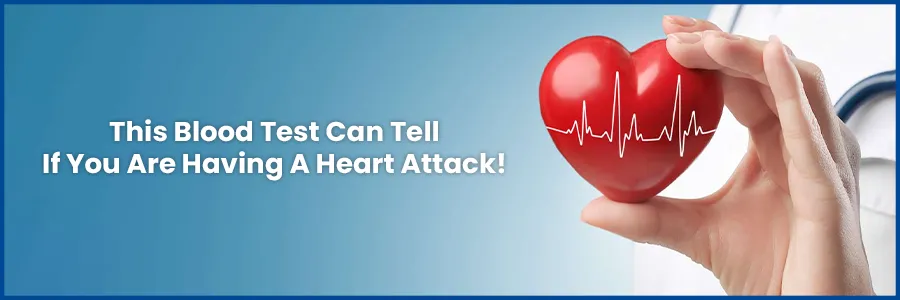This Blood Test Can Tell If You Are Having A Heart Attack!

A heart attack, or myocardial infarction, is a medical emergency that occurs when the blood supply to a part of the heart muscle is blocked, leading to the death of heart tissue. Rapid diagnosis and treatment are crucial in such situations to minimize damage and improve outcomes. Thanks to advances in medical science, a simple blood test has emerged as a powerful tool in identifying the presence of a heart attack. In this article, we'll delve into the details of this remarkable blood test, its significance, and how it is transforming the landscape of cardiac care.
Understanding Heart Attacks
Before diving into the blood test, it's important to understand what happens during a heart attack. Heart attacks typically occur when a coronary artery, which supplies blood to the heart muscle, becomes blocked by a blood clot or a buildup of fatty deposits called plaque. This blockage cuts off the flow of oxygen and nutrients to the heart muscle, leading to tissue damage or death within minutes.
Common symptoms of a heart attack include:
- Chest pain or discomfort
- Shortness of breath
- Pain or discomfort radiating to the arms, neck, jaw, back, or stomach
- Cold sweat
- Nausea or vomiting
- Feeling lightheaded or dizzy
The Role of Blood Tests in Diagnosing Heart Attacks
One of the key methods used in diagnosing a heart attack is blood tests. When heart muscle cells are damaged due to reduced blood flow, they release specific enzymes and proteins into the bloodstream. Detecting these biomarkers can provide valuable insights into whether a heart attack has occurred and the extent of damage.
The most common blood tests used for diagnosing heart attacks include:
- Troponin Test: Troponin is a protein found in heart muscle cells. When heart muscle cells are damaged, troponin is released into the bloodstream. The troponin test measures the levels of this protein in the blood. Elevated troponin levels are a strong indicator of a heart attack.
-
Creatine Kinase (CK) and CK-MB Test:
Creatine kinase is an enzyme found in various tissues, including the heart. The CK and CK-MB tests measure levels of this enzyme in the blood. Elevated CK-MB levels can indicate heart muscle damage. -
Myoglobin Test:
Myoglobin is a protein found in heart and skeletal muscle. Elevated myoglobin levels can be detected shortly after a heart attack and may serve as an early marker. -
B-type Natriuretic Peptide (BNP) Test:
While not specific to heart attacks, the BNP test measures levels of a hormone released by the heart in response to stress. Elevated BNP levels can indicate heart failure or other cardiac issues.
The Troponin Test: A Game-Changer
Among these blood tests, the troponin test has emerged as a game-changer in diagnosing heart attacks. Troponin is highly specific to heart muscle cells, and even minor elevations in troponin levels can indicate cardiac injury. This test is often conducted multiple times over several hours to track changes in troponin levels, as the levels may rise gradually after a heart attack.
Advantages of the Troponin Test:
- High Sensitivity: Troponin levels can be detected with high sensitivity, allowing for early detection of heart muscle damage.
- Accurate Diagnosis: The troponin test provides accurate information about the presence of a heart attack and helps differentiate it from other conditions with similar symptoms.
- Monitoring: Serial troponin testing helps medical professionals monitor the progression of cardiac injury and tailor treatment accordingly.
- Risk Stratification: Troponin levels can help determine the severity of the heart attack and assist in predicting the patient's prognosis.
Utilizing Blood Tests for Rapid Intervention
The availability of blood tests, especially the troponin test, has revolutionized the way heart attacks are diagnosed and treated. Rapid and accurate diagnosis enables healthcare providers to initiate appropriate interventions promptly, which is essential for minimizing heart muscle damage and improving patient outcomes.
The Importance of Timely Treatment
Time is of the essence in treating heart attacks. The longer the heart muscle is deprived of oxygen, the greater the damage that occurs. Blood tests play a crucial role in identifying heart attacks early, allowing medical professionals to take immediate action.
Treatment Options for Heart Attacks
Once a heart attack is diagnosed, treatment options may include:
- Medications: Aspirin, antiplatelet drugs, and clot-busting medications can help dissolve blood clots and restore blood flow.
- Angioplasty and Stenting: A procedure involving the insertion of a catheter to clear blockages and place a stent to keep the artery open.
- Coronary Artery Bypass Surgery: In cases of severe blockages, surgery may be performed to bypass the blocked artery using a blood vessel from another part of the body.
